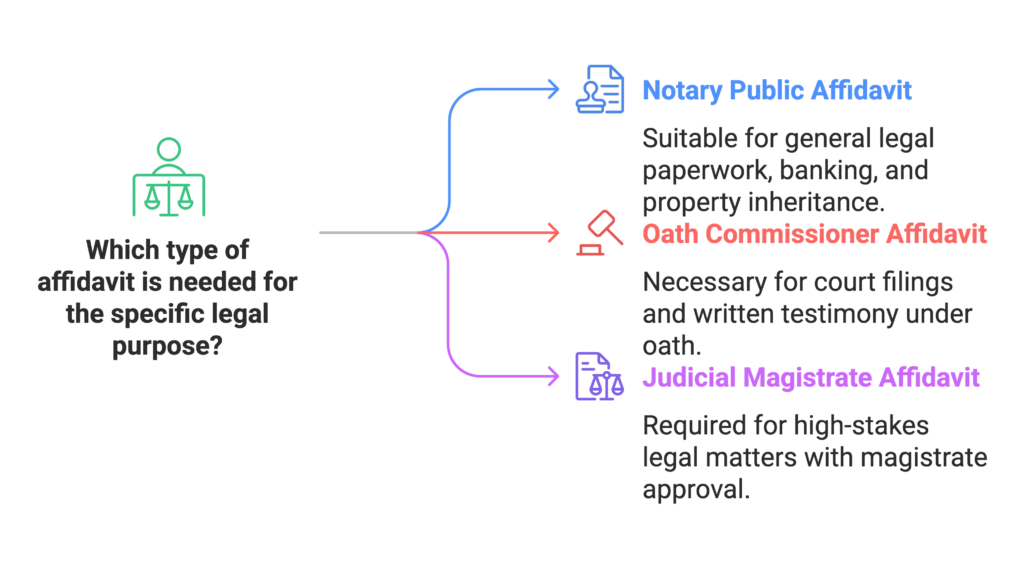- An affidavit is a legally sworn document declaring facts under oath, crucial in various legal situations.
- Notary Public Affidavit (80%) mainly used in banking, property, legal heir documentation, and financial agreements.
- Oath Commissioner Affidavit serves as official testimony in legal cases and court filings.
- Judicial Magistrate Affidavit offers the highest authenticity, required in high-stakes and criminal matters.
- Lying in an affidavit is a criminal offense, punishable under the Indian Penal Code Sections 191 and 193.
- A legally valid affidavit is binding and used as evidence in courts, banks, and government procedures.
- Ensure accurate information, proper attestation, and compliance with laws when drafting an affidavit.
An affidavit is a legally sworn document where an individual states facts under oath. This document holds significant legal weight and is commonly used in banking, property disputes, legal claims, and court cases. It must be affirmed before a Notary Public, Oath Commissioner, or Judicial Magistrate.
Types of Affidavits & Their Legal Validity
Notary Public Affidavit (80% of affidavits) – These are primarily used in banking, property inheritance, legal heir documentation, financial agreements, and general legal paperwork.
Oath Commissioner Affidavit – Required for legal cases and court filings to serve as official written testimony under oath.
Judicial Magistrate Affidavit – This carries the highest legal authenticity, reviewed and approved by a Magistrate or Judge. It is mainly required in high-stakes legal matters and criminal proceedings.

Legal Consequences of a False Affidavit
Lying in an affidavit is a criminal offense under the Indian Penal Code (IPC). Sections 191 and 193 IPC define the act of giving false evidence and its punishments.
⚖️ Section 191 IPC – “Whoever makes a false statement under oath or legally bound by an affidavit is guilty of perjury.”
⚠️ Section 193 IPC – Punishment for perjury:
•Imprisonment of up to 7 years and a fine if the false statement affects legal proceedings.
•Imprisonment of up to 3 years and a fine if it is not directly related to judicial proceedings.
Case Reference:
Sworn Affidavit in Court Proceedings – In Ajay Aggarwal v. Union of India (1993), the Supreme Court emphasized that false affidavits mislead courts and obstruct justice, making perjury a serious offense.
Property Affidavit Case – In K. K. Modi v. K. N. Modi (1998), the Supreme Court ruled that a false affidavit in property disputes could lead to perjury charges, voiding the legal claim.
Why is an Affidavit Important?
A legally valid affidavit is binding and is used as evidence in courts, banks, and government procedures. Whether for inheritance, financial claims, criminal trials, or real estate transactions, an affidavit is an essential legal instrument.
How to Draft a LEGALLY VALID Affidavit?
✅ Include accurate and truthful information – Avoid false statements at all costs!
✅ Get it signed, sealed, and attested by a Notary Public, Oath Commissioner, or Magistrate.
✅ Clearly mention the date, place, and sign the affidavit properly.
✅ Always check legal provisions and ensure compliance with relevant laws.